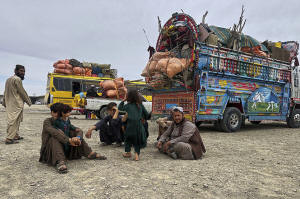US restores urgent food aid, except in Afghanistan and Yemen, two of the
world’s poorest countries
[April 10, 2025]
By SAMY MAGDY, RIAZAT BUTT and ELLEN KNICKMEYER
CAIRO (AP) — U.S. President Donald Trump's administration has reversed
new cutoffs in emergency food aid to several nations but maintained them
in Afghanistan and Yemen, two of the world's poorest and most
war-ravaged countries, according to the State Department and officials
who spoke to The Associated Press.
It marks the latest round of abrupt cancellations of foreign aid
contracts run through the U.S. Agency for International Development and
equally sudden reversals. The whipsawing moves come as the Republican
administration and Trump adviser Elon Musk’s Department of Government
Efficiency dismantle USAID and dramatically reduce foreign assistance,
asserting that the spending is wasteful and advances liberal causes.
The United States over the weekend sent notices terminating funding for
U.N. World Food Program emergency programs in more than a dozen
countries. Aid officials warned that the cuts could threaten the lives
of millions of refugees and other vulnerable people, stressing the risks
of further destabilizing regions ridden by conflicts.
The State Department confirmed Wednesday that it had reversed those cuts
in Somalia, Syria, Lebanon, Jordan, Iraq and Ecuador. It said it would
keep the cancellations for Afghanistan and Yemen but left the fate of
food aid in six other unidentified nations unclear.
Even in Syria, Somalia and other crisis areas where it had reinstated
support for lifesaving food programs, the U.S. would work with the U.N.
to modify its funding "to better align with Administration priorities,”
the State Department said by email. It gave no details.

Two USAID officials said Jeremy Lewin, the DOGE associate overseeing the
dismantling of the aid agency, ordered the reversal of some of his
contract terminations Tuesday, after the AP reported them. The officials
spoke on the condition of anonymity because they were not authorized to
brief the media.
Trump administration reverses some cuts
The USAID officials said Lewin sent a note internally expressing regret
for the sudden contract terminations and reversals. Secretary of State
Marco Rubio and others had pledged that the kind of lifesaving aid
targeted would be spared.
A United Nations official said the decision to restore funding came
after intense behind-the-scenes lobbying of members of Congress by
senior U.N. officials.
The State Department on Wednesday defended some of the new funding cuts,
including for Yemen and Afghanistan, saying they were based on "credible
and longstanding concerns that funding was benefitting terrorist groups
including the Houthis and the Taliban.”
At a briefing this week, department spokeswoman Tammy Bruce cited a U.S.
government watchdog's 2024 finding that department contractors reported
paying at least $10.9 million to Afghanistan's Taliban government in
taxes, utility payments and fees.
“Other programs with WFP that were terminated were contrary to an
America First agenda and didn’t make America stronger, safer, or more
prosperous,” the department said Wednesday.
Remaining cuts could still be disastrous
Sen. Jeanne Shaheen, the ranking Democrat on the Senate Foreign
Relations Committee, urged the administration to restore funding for
other critical programs as well.
“Despite continued assurances that life-saving programs would be
protected during the Trump Administration’s ‘review’ of foreign
assistance, DOGE again spent the weekend cutting World Food Program
assistance to feed people in crisis," the New Hampshire senator said.
It will “weaken America's standing around the world,” she added.

Nathaniel Raymond, executive director of the Humanitarian Research Lab
at the Yale School of Public Health, called the cuts “a potential
extinction-level event” for two generations of progress in limiting the
suffering of those caught in crises.
The U.S. had been the largest funder of the WFP, providing $4.5 billion
of the $9.8 billion in donations to the world's largest food aid
provider last year. Previous administrations had viewed such aid as
serving U.S. national security by alleviating conflict, poverty and
extremism and curbing migration.
Afghanistan is scarred by decades of war
More than half of Afghanistan’s population — some 23 million people —
need humanitarian assistance. It's a crisis caused by decades of
conflict — including the 20-year U.S. war with the Taliban — as well as
entrenched poverty and climate shocks.
[to top of second column]
|

Afghan refugees take rest at a transit station setup to facilitate
Afghan refugees' deportations, outskirt of Chaman, a town on the
Pakistan and Afghanistan border, Tuesday, April 8, 2025. (AP Photo)

Last year, the United States provided 43% of all international
humanitarian funding to Afghanistan.
The cuts affect about $560 million in humanitarian aid, including
for emergency food assistance, treatment of malnourished babies,
medical care, safe drinking water and mental health treatment for
survivors of sexual and physical violence, according to an
assessment by current and former USAID officials and partner
organizations. The figure has not been confirmed by the U.S.
government.
A separate WFP assessment obtained by the AP showed that food
assistance to 2 million people in Afghanistan would be terminated
later this year. More than 650,000 malnourished children, mothers
and pregnant women would would lose nutritional support.
The United Nations Population Fund said the U.S. had cut $100
million in support for maternal health services for millions of
women, as well as gender-based violence services.
The International Rescue Committee, whose programs include
nutritional assistance for tens of thousands of children under 5 and
counseling services, said the cuts would affect nearly 1 million
people.
“Kids who have seen great violence, who benefit from social work and
psychosocial care that we provide, will be cut off,” said Bob
Kitchen, IRC's head of global emergencies.
Some in Yemen have been at risk of famine
The poorest Arab country was plunged into war in 2014 when
Iranian-backed Houthi rebels seized much of the North, including the
capital, Sanaa. The U.S. supported a Saudi-led coalition that
intervened the following year on behalf of the government. The
conflict has been at a stalemate in recent years.
The war has led to widespread hunger, and experts warned as recently
as 2024 that parts of Yemen were at risk of famine.
The U.S. cuts would end lifesaving food assistance to 2.4 million
people and halt nutritional care for 100,000 children, WFP said.

The U.S. is carrying out a campaign of airstrikes against the
Houthis in retaliation for their attacks on international shipping
linked to the war in the Gaza Strip.
The WFP had already suspended its programs in Houthi-ruled northern
Yemen, where the rebels have detained dozens of U.N. staffers and
people associated with aid groups, civil society and the
now-shuttered U.S. Embassy.
The latest cuts would affect southern Yemen, where the
internationally recognized government opposed to the Houthis is
based. The WFP warned that halting aid there “carries significant
political and security implications and risks deepening the economic
crisis and exacerbating instability.”
Last year, the WFP assisted 8.6 million people in Yemen, more than a
quarter of its population, including more than 330,000 internally
displaced people and 1.2 million with disabilities. Half were women
and children.
More firings at USAID
Also Wednesday, the Trump administration and DOGE notified thousands
of local staffers employed by USAID missions overseas that they
would lose their jobs by Aug. 15. The group had been one of the last
spared from layoffs.
The administration says it will move about 1,000 surviving
humanitarian and development programs under the State Department,
after ending 5,000 others. The email notices, which were sent
Wednesday and reviewed by the AP, invited the newly laid-off workers
abroad to apply for State Department jobs.
All but a few hundred of thousands of other USAID staffers have
already been fired or been given severance notices effective this
summer.
___
Butt reported from Islamabad, Knickmeyer from Washington. Associated
Press writers Matthew Lee in Washington, Sam Mednick in Tel Aviv,
Israel, and Sarah El Deeb in Beirut contributed to this report.
All contents © copyright 2025 Associated Press. All rights reserved
 |